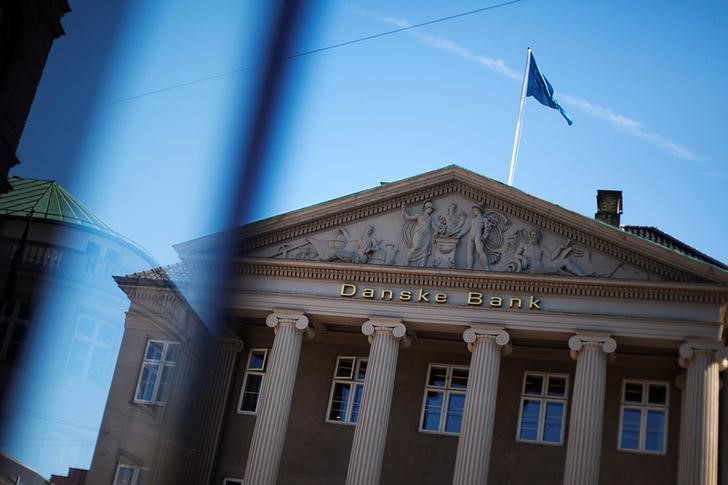COPENHAGEN/TALLINN (Reuters) - Banks doing business in Estonia, which has been at the centre of a money-laundering scandal involving Danske Bank , handled more than $1 trillion (768.18 billion pounds) in cross-border flows between 2008 and 2017, according to the country's central bank.
The European Union member country of just 1.3 million people has been rocked by revelations that banks there laundered money from Russia, Moldova and Azerbaijan via non-resident bank accounts. The scandal has forced lenders in Estonia and neighbouring Latvia to shut down.
The scale of the cross-border flows, first report by Bloomberg, suggests that money laundering through the small Baltic country may have been larger then previously thought. The news sent Nordic banking shares sharply lower.
The central bank said that between 2008 and 2017, cross-border transactions totalled 1.1 trillion euros ($1.27 trillion). The number includes all flows, including resident and non-resident transactions, a spokesman said.
Estonia's entire GDP is only about $23 billion.
The central bank did not say whether it considered any of the flows suspicious.
Bloomberg on Wednesday reported figures from the central bank saying that Estonia handled about 900 billion euros in non-resident cross-border transactions between 2008 and 2015.
A central bank spokesman told Reuters the bank does not have specific data for non-resident transactions.
"This is a surprising figure," said Danish expert on money laundering Jakob Dedenroth Bernhoft. "This indicates that the Danske case is not a one-off affair and that the problem related to other banks as well."
Sweden's SEB and Swedbank, which both have banking operations in Estonia, were trading 5.4 percent and 7.2 percent lower, respectively.
A trader says this is "clearly not good news in the light of Danske Bank, and the numbers they are talking about look to be bigger."
Another trader notes Nordic banks are "very well owned" - seen as the best of a bad bunch among European financials – and therefore vulnerable to bad news.
Swedbank's Baltic operations account for nearly one-fifth of its total operating profit, with Estonia its biggest market.
"We have worked continuously through the years together with authorities as well as correspondent banks to ensure that we have solid systems and processes concerning the fight against money laundering," a Swedbank spokesman said.
"Let me underline that we do not recognise ourselves in Bloomberg's reporting. We are a retail bank with low risk," he said.
Sweden's Swedbank is the largest bank in Estonia following its acquisition of Hansabank in 2005. It has 800,000 private customers and around 140,000 business customers in the country, according to its website.
Its Nordic rival SEB (ST:SEBa) also has major operations in the Baltics after acquisitions in the late 1990s. It had 920,000 private and 99,000 corporate customers according to its 2017 annual report.
"We have very few if any customers that are not based in the Baltic countries," an SEB spokesman said. "We feel satisfied that our process concerning these issues works."
Figures reflecting the possible scale of money-laundering through Estonia have been emerging gradually over the last few months.
In May, data from Estonia's Financial Intelligence Unit (FIU) showed that more than $13 billion had been laundered through banks in the country from 2012 to 2016, with at least 7.3 billion of that going through non-resident bank accounts.
Last month, Denmark's Danske Bank (CO:DANSKE) said in an internal report that payments totalling 200 billion euros, many of which it described as "suspicious", had been moved through its Estonian branch between 2007 and 2015.
That scandal led to Danske's chief executive stepping down and prompted regulators across the European Union to question the oversight of the bloc's financial sector.
